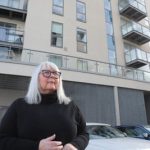I part-own my flat as part of the share-to-buy scheme. When I tried to access a fire safety form (EWS1) to increase my ownership share last October, the housing association, Optivo, told me the building had failed its fire safety inspection.
The fire safety officer advised me that there was a problem with the material behind the concrete facade and that the external walls would all need rebuilding. He estimated this would take up to five years.
Optivo had not informed any residents and all my questions have been deflected. Meanwhile, we are living in a block that is potentially dangerous. It is also now impossible to raise a mortgage since lenders require fire safety certificates, so all tenants are trapped in nearly worthless properties.
RC, London
This is terrifying, physically and financially. Residents across the land are similarly living in blocks deemed unsafe in the wake of the Grenfell Tower inferno, but your case is a particular concern since you were not officially informed of the issue. When you contacted me in the new year, I asked Optivo to confirm whether your block had, indeed, failed its fire safety inspection and, if so, what was being done.
Its response was evasive. It told me (correctly) that the EWS1 forms required by lenders are designed for buildings more than 18 metres tall and that two of the four blocks on the development, including yours, are lower than this. That’s beside the point. Optivo doesn’t deny that its fire safety officer informed you that the form could not be issued because the development did not meet fire safety requirements.
It seems this conclusion was reached after the two taller blocks, built of the same materials, were inspected last spring. The day after I got in touch, the association wrote to you and your neighbours informing them that it would be surveying the walls of the two smaller blocks that same week. “We continue to review all blocks, and sample and test the external wall finishes on those where we have concerns,” it said, promising that the details would be shared with residents.
The investigation was duly carried out but you were told that residents would not be given sight of it, even though you may be liable for the recommended costs. Optivo tells me this is because it is considering whether to pursue claims against the companies who designed and built the development.
You’ve now heard, via informal sources, that an £8m contract has been agreed to carry out the works, but you have no idea how many flats are involved and how that will be divided. Back to Optivo, which told me it’s unable to provide cost predictions and that it’s lobbying government to provide funding.
“We’ve always been clear Optivo will only pass on costs to leaseholders as a last resort, after all other options have been exhausted,” it said. So, six months on, you are no further forward, except that the fire risk is confirmed.
The End Our Cladding Scandal campaign group says it is common and inexcusable for vital safety reports to be withheld from residents. “Living in a dangerous building – and not being told just how unsafe it is – is incredibly stressful,” said spokesperson Carine Marzin. “And people worry about the life-changing bills.”
The Ministry for Housing, Communities and Local Government told me that residents had the right to see fire risk assessments and that under the Landlord and Tenant Act 1985, building owners should keep leaseholders informed. “We are clear that the safety of buildings is the responsibility of the owner and they should meet the costs of remediation without passing them on to leaseholders wherever possible,” it said.
“Where this is not happening, the government is stepping in and providing over £5bn to protect leaseholders from the costs of cladding remediation on high-rise residential buildings and to ensure that no leaseholder in buildings of 11 to 18 metres will pay more than £50 a month.”
Email your.problems@observer.co.uk. Include an address and phone number. Submission and publication are subject to our terms and condition.



